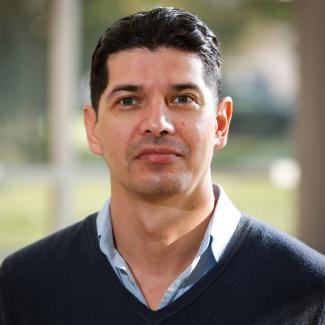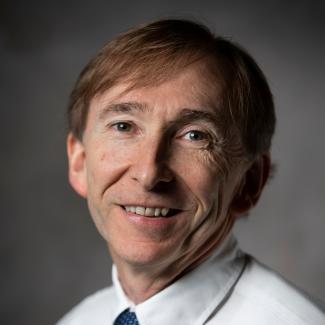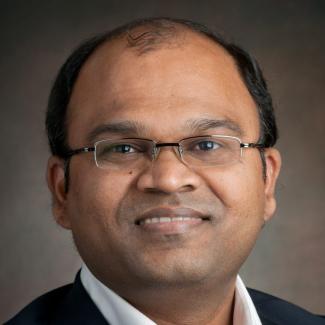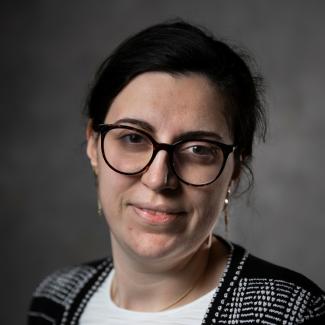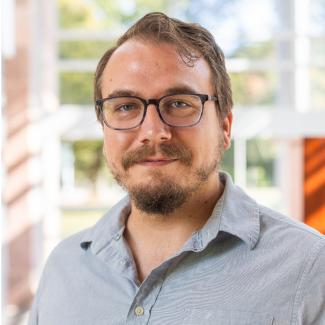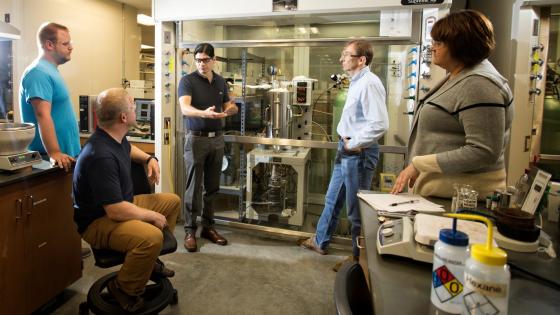
Sustainable and Alternative Fuels
Environmental Catalysis
Developing novel catalytic technology to reduce emissions of harmful air pollutants, and promote a new sustainable industrial chemistry.
Biofuel Development
Analyzing various forms of biomass as a feedstock for the production of biofuels and platform chemicals. Exploring new processes for converting bio/waste oils into renewable fuels.
Algae Research
Investigating algae based carbon dioxide utilization and exploring ways to produce biofuels, bioplastics, and high value chemicals more sustainably.
Fischer-Tropsch Catalysis Testing
For over 20 years, UK CAER has explored the catalytic conversion of coal synthesis gas to valuable chemicals via the Fischer-Tropsch (FT) process.
Coal Gasification
Exploring the commercial and technical viability of advanced coal gasification technologies, particularly how to reduce carbon emissions from these plants.
Experiential Education
Offering research opportunities and mentoring to students in order to train the next generation of scientists, engineers, and technologists.
Reducing Harmful Emissions in Automotive Engines
Traditional automotive engines rely on a device known as a three-way catalytic converter to control harmful exhaust emissions. Unfortunately, the existing technology to support these devices fails to function efficiently at low temperatures, such as when the engine is starting up. Our environmental catalysis teams are working hard to develop advanced automotive catalytic technologies, engineered to effectively reduce harmful combustion emissions at ambient temperatures.
Beneficial Re-use of Carbon Emissions from Coal-Fired Power Plants Using Microalgae
The University of Kentucky (UK) Research Foundation is developing a cost-effective process to convert carbon dioxide (CO2) from coal-fired power plants to value-added biological-based products such as bioplastics, chemicals, and fuels using microalgae in a dual photobioreactor (PBR)/pond cultivation system.
Improving Catalysis Technology
UK CAER’s Clean Fuels and Chemicals group is internationally known for its groundbreaking Fischer-Tropsch (FT) research program. Under the guidance of world-renowned FT researcher Burt Davis, the Center has become the go-to laboratory for FT catalyst testing for industry partners.
The Fischer Tropsch process centers on the reaction of hydrogen with carbon monoxide, carbon dioxide or mixtures of these (FT synthesis) to yield one or more carbon compounds, e.g., hydrocarbons, alcohols, esters, acids, ketones, aldehydes, etc. The purification, separation, conversion or treatment of one or more of the products resulting from the FT synthesis, such as by oxidation, adsorption, solvent extraction, etc., is also of paramount importance.
The Center’s lab features 23 continuous stirred reactors (CSTR) as well a modified two-inch inside diameter, six-foot slurry bubble column reactor. The reactor produces the same amount of product that can produced in 16 CSTRs, permitting our technical team to provide sufficient sample material for a company to evaluate FT-products in a range of potential applications that they may wish to develop.
Reducing the Environmental Impact of Coal Gasification
Our 5,800 sq. foot coal/biomass to liquids (CBTL) research facility provides the scientific and industrial community with an affordable testing ground for new concepts. Our researchers evaluate the commercial and technical viability of advanced CBTL technologies. In particular, we explore the environmental considerations, including how to manage and reduce carbon dioxide emissions from these plants.
Broadening Participation in Engineering
We recognize the importance of developing a diverse and well-prepared engineering workforce. We’ve implemented a research center-based mentoring program to improve the engineering interests, preparation, connections, experiences, and opportunities among underrepresented groups.
Featured Publications
T. Morgan, E. Santillan-Jimenez, K. Huff, K.R. Javed, M. Crocker, “Use of Dual Detection in the Gas Chromatographic Analysis of Oleaginous Biomass Feeds and Biofuels Products to Enable Accurate Simulated Distillation and Lipid Profiling”, Energy & Fuels, 31 (2017) 9498.
J.A. Jennings, S. Parkin, E. Munson, S.P. Delaney, J.L. Calahan, M. Isaacs, K. Hong, M. Crocker, “Regioselective Baeyer-Villiger Oxidation of Lignin Model Compounds with Tin Beta Zeolite Catalyst and Hydrogen Peroxide”, RSC Advances, 7 (2017) 25987.
Y. Ji, D. Xu, S. Bai, U. Graham, M. Crocker, B. Chen, C. Shi, D. Harris, D. Scapens, J. Darab, “Pt- and Pd-promoted CeO2-ZrO2 for passive NOx adsorber applications”, Ind. Eng. Chem. Res., 56 (2017) 111.
R. Loe, E. Santillan-Jimenez, T. Morgan, L. Sewell, Y. Ji, S. Jones, M.A. Isaacs, A.F. Lee, M. Crocker, “Effect of Cu and Sn promotion on the catalytic deoxygenation of model and algal lipids to fuel-like hydrocarbons over supported Ni catalysts”, Appl. Catal. B, 191 (2016) 147.
M.H. Wilson, D.T. Mohler, J.G. Groppo, T. Grubbs, S. Kesner, E.M. Frazar, A. Shea, C. Crofcheck, M. Crocker, “Capture and Recycle of Industrial CO2 Emissions using Microalgae”, Appl. Petrochem. Res., 6(3) (2016) 279.
